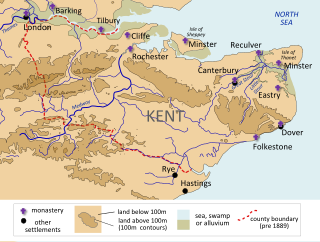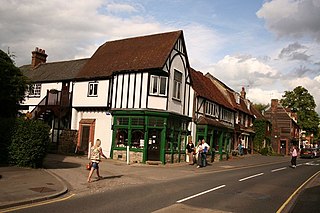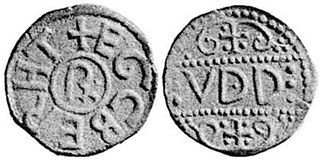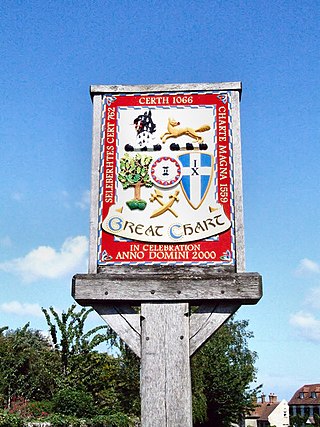
Mercia was one of the three main Anglic kingdoms founded after Sub-Roman Britain was settled by Anglo-Saxons in an era called the Heptarchy. It was centred on the River Trent and its tributaries, in a region now known as the Midlands of England.

Offa was King of Mercia, a kingdom of Anglo-Saxon England, from 757 until his death. The son of Thingfrith and a descendant of Eowa, Offa came to the throne after a period of civil war following the assassination of Æthelbald. Offa defeated the other claimant, Beornred. In the early years of Offa's reign, it is likely that he consolidated his control of Midland peoples such as the Hwicce and the Magonsæte. Taking advantage of instability in the kingdom of Kent to establish himself as overlord, Offa also controlled Sussex by 771, though his authority did not remain unchallenged in either territory. In the 780s he extended Mercian Supremacy over most of southern England, allying with Beorhtric of Wessex, who married Offa's daughter Eadburh, and regained complete control of the southeast. He also became the overlord of East Anglia and had King Æthelberht II of East Anglia beheaded in 794, perhaps for rebelling against him.

Ecgberht, also spelled Egbert, Ecgbert, Ecgbriht, Ecgbeorht, and Ecbert, was King of Wessex from 802 until his death in 839. His father was King Ealhmund of Kent. In the 780s, Ecgberht was forced into exile to Charlemagne's court in the Frankish Empire by the kings Offa of Mercia and Beorhtric of Wessex, but on Beorhtric's death in 802, Ecgberht returned and took the throne.

Æthelwulf was King of Wessex from 839 to 858. In 825, his father, King Ecgberht, defeated King Beornwulf of Mercia, ending a long Mercian dominance over Anglo-Saxon England south of the Humber. Ecgberht sent Æthelwulf with an army to Kent, where he expelled the Mercian sub-king and was himself appointed sub-king. After 830, Ecgberht maintained good relations with Mercia, and this was continued by Æthelwulf when he became king in 839, the first son to succeed his father as West Saxon king since 641.

Æthelbald was the King of Mercia, in what is now the English Midlands from 716 until he was killed in 757. Æthelbald was the son of Alweo and thus a grandson of King Eowa. Æthelbald came to the throne after the death of his cousin, King Ceolred, who had driven him into exile. During his long reign, Mercia became the dominant kingdom of the Anglo-Saxons, and recovered the position of pre-eminence it had enjoyed during the strong reigns of Mercian kings Penda and Wulfhere between about 628 and 675.

Wulfhere or Wulfar was King of Mercia from 658 until 675 AD. He was the first Christian king of all of Mercia, though it is not known when or how he converted from Anglo-Saxon paganism. His accession marked the end of Oswiu of Northumbria's overlordship of southern England, and Wulfhere extended his influence over much of that region. His campaigns against the West Saxons led to Mercian control of much of the Thames valley. He conquered the Isle of Wight and the Meon valley and gave them to King Æthelwealh of the South Saxons. He also had influence in Surrey, Essex, and Kent. He married Eormenhild, the daughter of King Eorcenberht of Kent.

Coenwulf was the King of Mercia from December 796 until his death in 821. He was a descendant of King Pybba, who ruled Mercia in the early 7th century. He succeeded Ecgfrith, the son of Offa; Ecgfrith only reigned for five months, and Coenwulf ascended the throne in the same year that Offa died. In the early years of Coenwulf's reign he had to deal with a revolt in Kent, which had been under Offa's control. Eadberht Præn returned from exile in Francia to claim the Kentish throne, and Coenwulf was forced to wait for papal support before he could intervene. When Pope Leo III agreed to anathematise Eadberht, Coenwulf invaded and retook the kingdom; Eadberht was taken prisoner, was blinded, and had his hands cut off. Coenwulf also appears to have lost control of the kingdom of East Anglia during the early part of his reign, as an independent coinage appears under King Eadwald. Coenwulf's coinage reappears in 805, indicating that the kingdom was again under Mercian control. Several campaigns of Coenwulf's against the Welsh are recorded, but only one conflict with Northumbria, in 801, though it is likely that Coenwulf continued to support the opponents of the Northumbrian king Eardwulf.
Ealhmund was King of Kent in 784. He is reputed to be the father of King Egbert who was King of Wessex and, later, King of Kent. Asser's The Life of King Alfred identifies him as the son of Eafa.

The Kingdom of the Kentish, today referred to as the Kingdom of Kent, was an early medieval kingdom in what is now South East England. It existed from either the fifth or the sixth century AD until it was fully absorbed into the Kingdom of Wessex in the late 9th century and later into the Kingdom of England in the early 10th century.

The Battle of Ellendun or Battle of Wroughton was fought between Ecgberht of Wessex and Beornwulf of Mercia in September 825. Sir Frank Stenton described it as "one of the most decisive battles of English history". It effectively ended Mercian Supremacy over the southern kingdoms of Anglo-Saxon England and established West Saxon dominance in southern England.

Otford is a village and civil parish in the Sevenoaks District of Kent, England. It lies on the River Darent, 3 miles (5 km) north of Sevenoaks. Otford's four churches are the Anglican Church of St Bartholomew in the village centre, the Otford Methodist Church, the Most Holy Trinity Roman Catholic Church, and the Otford Evangelical Church. By the village pond, there are pubs, cafes and shops. The village has three schools, Otford Primary School, St Michael's Prep School, and Russell House.
Coenred was king of Mercia from 704 to 709. Mercia was an Anglo-Saxon kingdom in the English Midlands. He was a son of the Mercian king Wulfhere, whose brother Æthelred succeeded to the throne in 675 on Wulfhere's death. In 704, Æthelred abdicated in favour of Coenred to become a monk.

Ecgberht II was king of Kent jointly with Heaberht.

Wiglaf was King of Mercia from 827 to 829 and again from 830 until his death. His ancestry is uncertain: the 820s were a period of dynastic conflict within Mercia and the genealogy of several of the kings of this time is unknown. Wigstan, his grandson, was later recorded as a descendant of Penda of Mercia, so it is possible that Wiglaf was descended from Penda, one of the most powerful seventh-century kings of Mercia.
Jænberht was a medieval monk, and later the abbot, of St Augustine's Abbey, Canterbury, who was named Archbishop of Canterbury in 765. As archbishop, he had a difficult relationship with King Offa of Mercia, who at one point confiscated lands from the archbishopric. By 787, some of the bishoprics under Canterbury's supervision were transferred to the control of the newly created Archbishopric of Lichfield, although it is not clear if Jænberht ever recognised its legitimacy. Besides the issue with Lichfield, Jænberht also presided over church councils in England. He died in 792 and was considered a saint after his death.
Hygeberht was the bishop of Lichfield from 779 and archbishop of Lichfield after the elevation of Lichfield to an archdiocese some time after 787, during the reign of the powerful Mercian king Offa. Little is known of Hygeberht's background, although he was probably a native of Mercia.

Great Chart is a village and former civil parish, now in the parish of Great Chart with Singleton, in the Ashford borough of Kent, England. The parish is split between the ancient village of Great Chart and the modern Singleton neighbourhood on the western outskirts of Ashford. The village centre of Great Chart is 2 miles (3.2 km) from the town centre. In 1961 the parish had a population of 969.
Eardwulf was king of Northumbria from 796 to 806, when he was deposed and went into exile. He may have had a second reign from 808 until perhaps 811 or 830. Northumbria in the last years of the eighth century was the scene of dynastic strife between several noble families: in 790, king Æthelred I attempted to have Eardwulf assassinated. Eardwulf's survival may have been viewed as a sign of divine favour. A group of nobles conspired to assassinate Æthelred in April 796 and he was succeeded by Osbald: Osbald's reign lasted only twenty-seven days before he was deposed and Eardwulf became king on 14 May 796.
Events from the 8th century in England.
The Battle of Bensington was a major battle fought between Mercia, led by King Offa, and the West Saxons led by Cynewulf of Wessex. It ended with a victory for the Mercians.












